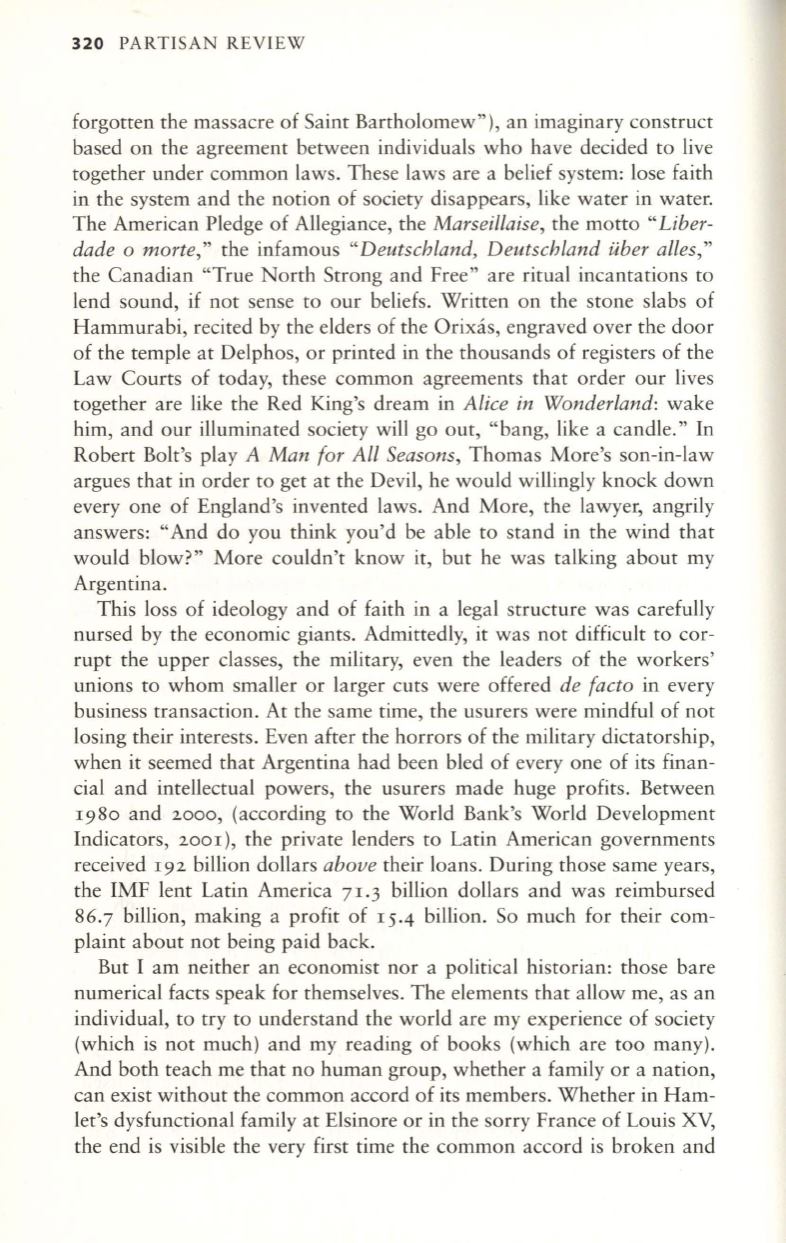
320
PARTISAN REVIEW
forgotten the massacre of Saint Bartholomew"), an imaginary construct
based on the agreement between individuals who have decided to live
together under common laws. These laws are a belief system: lose faith
in the system and the notion of society disappears, like water in water.
The American Pledge of Allegiance, the
Marseillaise,
the motto
"Liber–
dade
a
morte,"
the infamous
"Deutschland, Deutschland iiber alles,"
the Canadian "True North Strong and Free" are ritual incantations to
lend sound, if not sense to our beliefs. Written on the stone slabs of
Hammurabi, recited by the elders of the Orixas, engraved over the door
of the temple at Delphos, or printed in the thousands of registers of the
Law Courts of today, these common agreements that order our lives
together are like the Red King's dream in
Alice in Wonderland:
wake
him, and our illuminated society will go out, "bang, like a candle." In
Robert Bolt's play
A Man for All Seasons,
Thomas More's son-in-law
argues that in order to get at the Devil, he would willingly knock down
everyone of England's invented laws. And More, the lawyer, angrily
answers: "And do you think you'd be able to stand in the wind that
would blow?" More couldn't know it, but he was talking about my
Argentina.
This loss of ideology and of faith in a legal structure was carefully
nursed by the economic giants. Admittedly, it was not difficult to cor–
rupt the upper classes, the military, even the leaders of the workers'
unions to whom smaller or larger cuts were offered
de facto
in every
business transaction. At the same time, the usurers were mindful of not
losing their interests. Even after the horrors of the military dictatorship,
when it seemed that Argentina had been bled of everyone of its finan–
cial and intellectual powers, the usurers made huge profits. Between
I980
and
2000,
(according to the World Bank's World Development
Indicators,
200I),
the private lenders to Latin American governments
received
I92
billion dollars
above
their loans. During those same years,
the IMF lent Latin America 71.3 billion dollars and was reimbursed
86.7 billion, making a profit of
I
5.4
billion. So much for their com–
plaint about not being paid back.
But I am neither an economist nor a political historian: those bare
numerical facts speak for themselves. The elements that allow me, as an
individual, to try to understand the world are my experience of society
(which is not much) and my reading of books (which are too many).
And both teach me that no human group, whether a family or a nation,
can exist without the common accord of its members. Whether in Ham–
let's dysfunctional family at Elsinore or in the sorry France of Louis XV,
the end is visible the very first time the common accord is broken and


